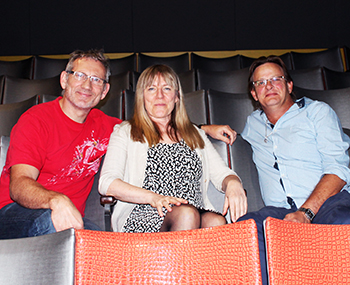
Prof Annie van den Oever from the Netherlands presented a series of guest lectures on media technologies to students of the Film and Visual Media Programme at the University of the Free State (UFS). Here from left is Chris Vorster, lecturer in Drama and Theatre Arts, Prof Van den Oever, and Dr Pieter Venter, Senior lecturer at Drama and Theatre Arts.
Photo: Jóhann Thormählen |
She played a part in conceptualising the Film and Visual Media Programme at the University of the Free State (UFS), and sees film from a perspective different from most young South Africans.
According to Chris Vorster, lecturer of the UFS BA Honours degree in Film and Visual Media, this is one of the reasons why Prof Annie van den Oever’s visit is of such great value. The actor, who is a lecturer in Drama and Theatre Arts, believes it is important to expose his students to influences outside their normal experience.
Prof Van den Oever, an extraordinary professor at the UFS since 2011, presented a series of guest lectures on media technologies from 11-14 April 2016 at the Audio Visual Studio on the Bloemfontein Campus. She is a senior researcher for Film at the University of Groningen in the Netherlands, and an Associated Researcher for Film at Paris 1, Panthéon Sorbonne, in France.
Another milieu
“It is invaluable for students, in any field of study, to receive as many influences from the outside. Therefore, it is important to have someone here from another milieu and context. And academically, she is outstanding,” says Vorster.
Vorster’s students are also exposed to practical expertise from the industry in the country, not only academics.
Relationship with UFS
Prof Van den Oever says she usually visits the UFS twice a year. Her recent lecture series on media technologies was about the power of visual and film culture today, and how you can understand its powers. “Why strange effects work strongly and why the strange is inserted, because people respond strongly to them,” she says.
Prof van den Oever enjoys meeting new people, and often works with colleagues from the UFS on various projects. She also is full of praise for the management of the university. “It is great to work across cultures, and be part of a university in transition.”